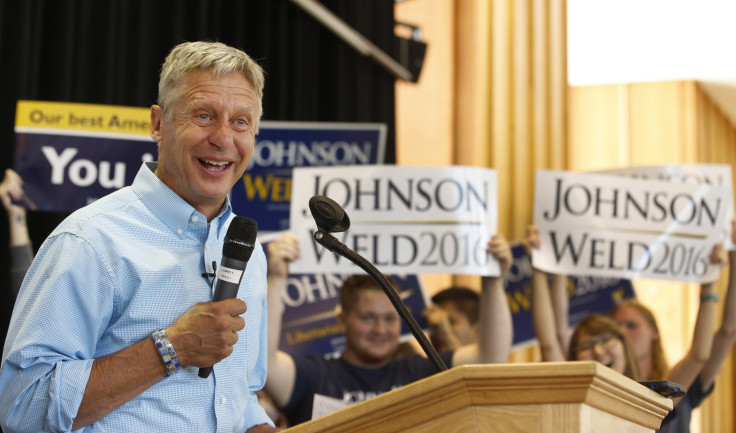Will Gary Johnson Get In The Debates? Not If Clinton Supporters Can Help It

While many interpreted Monday night’s debate as a victory for Hillary Clinton, the Democratic candidate’s supporters have turned their attention to the threat of third-party candidate Gary Johnson stealing votes in November, The Hill reported Wednesday.
NextGen Climate, a progressive, pro-Clinton group founded by billionaire environmentalist Tom Steyer, launched an attack ad Friday showing footage of Johnson advocating for the construction of coal plants that claims he’s “not smart enough to know if global warming is man-made.” The video sums up its point with an ultimatum: “Vote Nov. 8th for someone who gets it.”
Left-leaning publications have put in their two cents as well: Raw Story took a blatant anti-Johnson approach with an opinion piece on “12 ways Gary Johnson is a hardcore right-wing radical,” and a Mother Jones piece asked (rhetorically) “Why Are There Any Liberals Supporting Gary Johnson?” while listing 18 reasons why they shouldn’t.
While RealClearPolitics’ average of recent polling data places Clinton in first with 42.6 percent, Trump in second with 41.1 percent and Libertarian Gary Johnson far behind them with just 7.2 percent, a national Quinnipiac poll showed a surge in Johnson’s popularity among voters ages 18 to 34 between late August and mid-September.
Johnson’s support among likely millennial voters nearly doubled, from 16 percent during an Aug. 25 poll to 29 percent on Sept. 15. Likewise, Green Party candidate Jill Stein’s millennial support rose from 11 percent in the August poll to 15 percent in September’s. Clinton’s support among millennials, on the other hand, fell from 48 percent to 31 percent over the same period, while Trump’s millennial support increased slightly from 24 percent to 26 percent.
Despite Johnson’s stubbornly low national polling results, the former New Mexico governor told MSNBC’s Thomas Roberts on Tuesday that he still had hopes for a debate appearance in the five weeks leading up to the election. When asked if he might be spoiling things for the two major party candidates, Johnson said, “I’m giving people a first choice—that’s what I’m proud of.”
The next presidential debate, on Oct. 9, requires participants to have “a level of support of at least 15 percent of the national electorate as determined by five selected national public opinion polling organizations,” according to the Commission on Presidential Debates, the non-profit sponsor of every presidential debate since 1988.
© Copyright IBTimes 2025. All rights reserved.






















